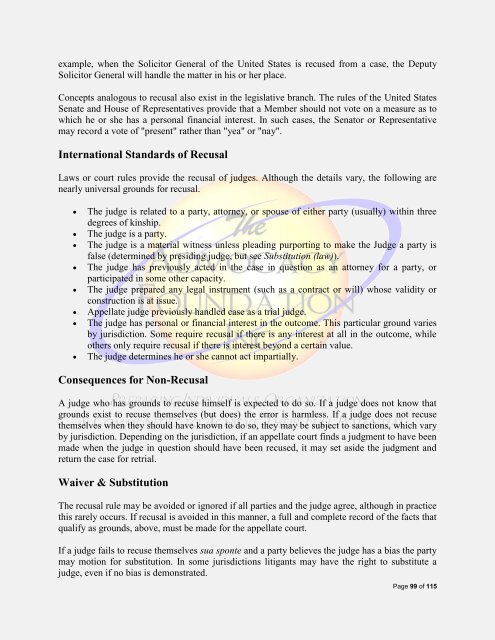Judicial ReEngineering
Judicial ReEngineering
Judicial ReEngineering
You also want an ePaper? Increase the reach of your titles
YUMPU automatically turns print PDFs into web optimized ePapers that Google loves.
example, when the Solicitor General of the United States is recused from a case, the Deputy<br />
Solicitor General will handle the matter in his or her place.<br />
Concepts analogous to recusal also exist in the legislative branch. The rules of the United States<br />
Senate and House of Representatives provide that a Member should not vote on a measure as to<br />
which he or she has a personal financial interest. In such cases, the Senator or Representative<br />
may record a vote of "present" rather than "yea" or "nay".<br />
International Standards of Recusal<br />
Laws or court rules provide the recusal of judges. Although the details vary, the following are<br />
nearly universal grounds for recusal.<br />
<br />
<br />
<br />
<br />
<br />
<br />
<br />
<br />
The judge is related to a party, attorney, or spouse of either party (usually) within three<br />
degrees of kinship.<br />
The judge is a party.<br />
The judge is a material witness unless pleading purporting to make the Judge a party is<br />
false (determined by presiding judge, but see Substitution (law)).<br />
The judge has previously acted in the case in question as an attorney for a party, or<br />
participated in some other capacity.<br />
The judge prepared any legal instrument (such as a contract or will) whose validity or<br />
construction is at issue.<br />
Appellate judge previously handled case as a trial judge.<br />
The judge has personal or financial interest in the outcome. This particular ground varies<br />
by jurisdiction. Some require recusal if there is any interest at all in the outcome, while<br />
others only require recusal if there is interest beyond a certain value.<br />
The judge determines he or she cannot act impartially.<br />
Consequences for Non-Recusal<br />
A judge who has grounds to recuse himself is expected to do so. If a judge does not know that<br />
grounds exist to recuse themselves (but does) the error is harmless. If a judge does not recuse<br />
themselves when they should have known to do so, they may be subject to sanctions, which vary<br />
by jurisdiction. Depending on the jurisdiction, if an appellate court finds a judgment to have been<br />
made when the judge in question should have been recused, it may set aside the judgment and<br />
return the case for retrial.<br />
Waiver & Substitution<br />
The recusal rule may be avoided or ignored if all parties and the judge agree, although in practice<br />
this rarely occurs. If recusal is avoided in this manner, a full and complete record of the facts that<br />
qualify as grounds, above, must be made for the appellate court.<br />
If a judge fails to recuse themselves sua sponte and a party believes the judge has a bias the party<br />
may motion for substitution. In some jurisdictions litigants may have the right to substitute a<br />
judge, even if no bias is demonstrated.<br />
Page 99 of 115

















